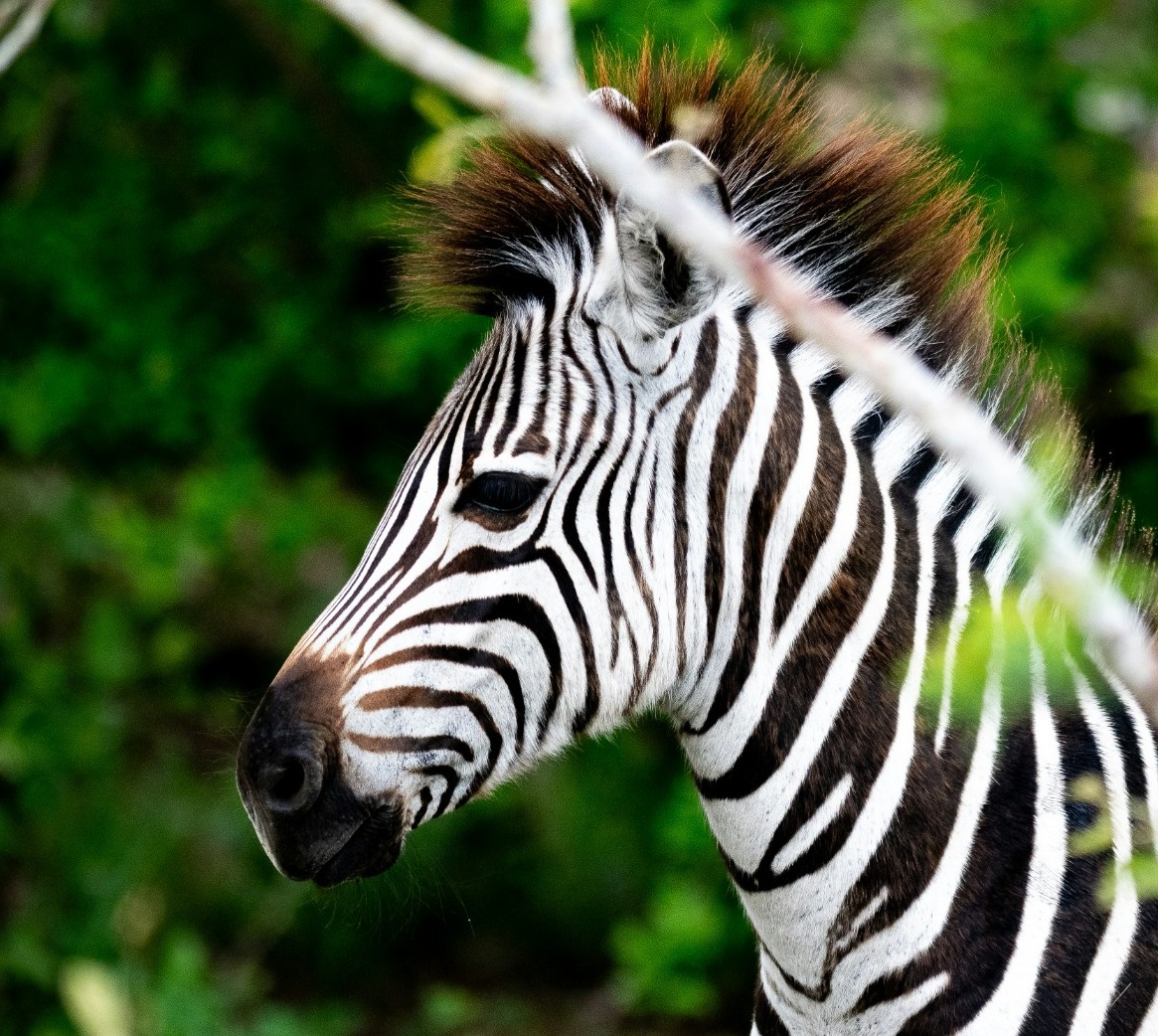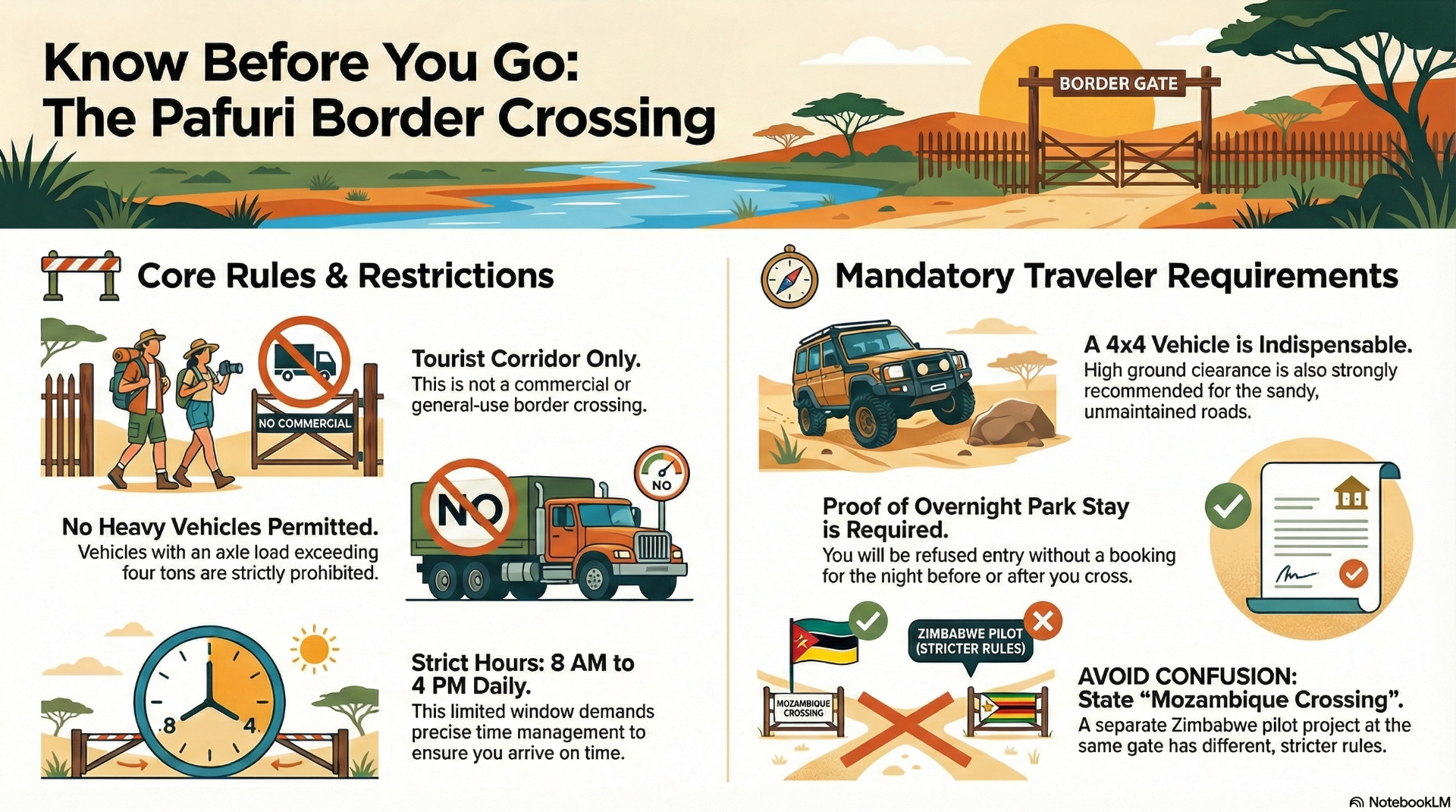
Pafuri border crossing point
The 4 crossing points
- Lebombo Border Post
- Kosi Bay Border/Ponta do Ouro Border Post
- Giriyondo Border Post
- Pafuri Border Post

Border Crossings: Pafuri / Limpopo
The Pafuri Border Gate (South African side), officially known as Pafuri / Limpopo (Parque Nacional do Limpopo) on the Mozambican side, is one of four official land crossings between the two countries. Located in the far northern reaches of Kruger National Park (KNP) in Limpopo Province, this is a highly specialized, low-volume access point whose operation is entirely embedded within the mandate of the Great Limpopo Transfrontier Park (GLTP).
Like Giriyondo, Pafuri is designed for a specific purpose and specific type of traveler. If you're looking for a quick border hop, look elsewhere.
1. Mandate and Function (Pure Tourism Corridor)
Pafuri is explicitly designed as a Tourist Access Facility to enable seamless travel between Kruger National Park (KNP) in South Africa and Limpopo National Park (LNP) in Mozambique.
What's Not Allowed
Commercial Traffic: Pafuri is strictly closed to commercial traffic. No exceptions.
Axle Load Restriction: No vehicles with an axle load exceeding four tons are permitted, protecting the park infrastructure from damage.
Why So Strict? These restrictions were introduced to eliminate "undesirable tendencies" – overloaded, unroadworthy vehicles, excessive speed, and wildlife accidents – that were undermining the experience for other park visitors. The goal is to maintain Pafuri as a pristine wilderness corridor, not a general transit route.
2. Operating Hours and Logistical Constraints
Unlike the commercial crossing at Lebombo (which operates into the night), Pafuri maintains strictly limited opening hours that demand precise time management.
Operating Schedule
Regular Hours: Standard operating times are 8am to 4pm year-round.
The Time Challenge
With only eight hours of operation and mandatory speed limits within both KNP and LNP to observe, punctual arrival is critical. Factor in wildlife on roads, mandatory rest stops, and the simple reality that you cannot rush through a national park, and you'll see why every minute counts.
3. The Mandatory Overnight Requirement
The most important and non-negotiable regulatory condition for using Pafuri (as with Giriyondo) is the overnight requirement, which reinforces the crossing as a pure park corridor.
Proof Required
Visitors must provide documentary evidence of at least one official overnight booking in either Kruger National Park (KNP) or Limpopo National Park (LNP).
Timing: Your booking date must fall immediately before or immediately after the date of your border crossing.
Consequence of Non-Compliance: Without this proof, border crossing will be refused. There's no negotiating, no explaining your way through. No booking confirmation, no crossing.
This rule ensures Pafuri serves transfrontier park visitors exclusively, preserving the wilderness experience and preventing the crossing from becoming a general-use route.
4. Vehicle Requirements and Road Conditions
Due to the nature of roads in Parque Nacional do Limpopo (LNP), specific vehicle requirements apply.
What You Need
High Ground Clearance: Generally strongly recommended for all vehicles.
4x4 Essential: A 4x4 vehicle is functionally indispensable, particularly during the rainy season (October to March), as roads in the LNP often consist of thick sand and less-maintained tracks.
Road Reality
Roads in the LNP are typically narrower and more difficult to navigate than the main routes in KNP. This isn't a scenic drive on well-graded gravel – it's genuine bush driving that will test both vehicle and driver.
Access Route (South African Side)
The main approach route to Pafuri Gate is the R525. The final section is a dirt track, and there's a seasonal risk that the Mutale River bridge may flood, cutting off access for a day or two. If you're traveling during the rainy season, check conditions before setting out.
5. Administrative and Documentary Requirements
Visa Acquisition
Visas can be purchased on the Mozambican side of the border crossing, but not on the South African side. Plan accordingly and have the necessary cash (USD) ready.
Mandatory Documents
The usual documentation requirements apply:
- Valid passport (minimum 30 days validity beyond your planned return date, with two blank pages)
- Temporary Import Permit (TIP)
- Mandatory third-party liability insurance
- Notarized letter of authorization from the bank if your vehicle is financed
CRITICAL: Avoid Confusion with the SA/Zimbabwe Pilot Project
Here's where things get potentially confusing. At Pafuri Gate on the South African side, a pilot project for a tourist border crossing to Zimbabwe (Gonarezhou) was recently established. This pilot has extremely different rules:
- Mandatory 4-night stay
- Booking required 14 days in advance
- Only open twice weekly
These rules do NOT apply to travelers heading to Mozambique.
Travelers must ensure they strictly follow the rules for the SA/Mozambique route (single overnight, open daily) to avoid confusion and rejection at the border. Make it absolutely clear to officials that you're crossing into Mozambique, not Zimbabwe.
The Pafuri Choice: Remote Wilderness, Strict Rules
Pafuri offers something increasingly rare: a genuine wilderness border crossing that prioritizes conservation and authentic safari experiences over convenience and volume.
To use it successfully, you need:
✓ A capable 4x4 vehicle with high ground clearance
✓ Confirmed accommodation in KNP or LNP for the night before or after crossing
✓ Awareness of the 8am-4pm operating window
✓ Proper documentation and preparation
✓ Understanding that this is a park corridor, not a shortcut
What you get is extraordinary: access to one of southern Africa's most pristine wilderness areas, crossing between two magnificent national parks through landscapes that remain wild and largely unchanged.
This is a border for serious safari enthusiasts who understand that the journey is the destination. If that describes you, Pafuri offers an experience that few other crossings can match. Just make absolutely sure you've met all the requirements before you arrive – because at this remote outpost, there's no Plan B.